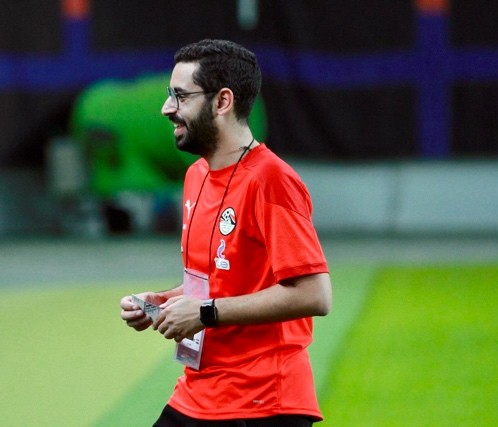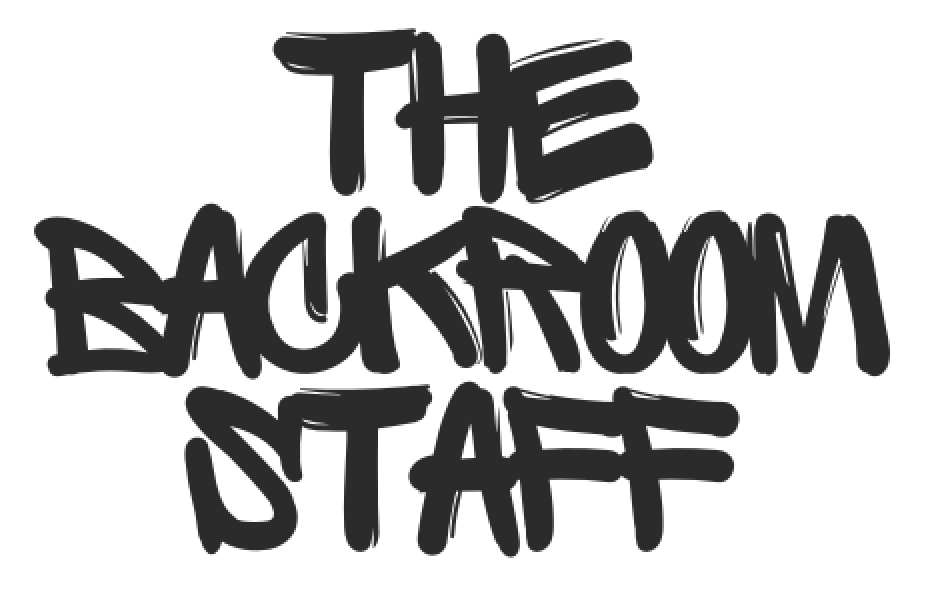Few roles in football are more important - yet more overlooked - than those of a team’s administrators. Responsible for everything from booking flights and hotels to checking the distance to the nearest hospital and making sure the Wi-Fi works in every room, it’s an indispensable role that lets players and staff focus entirely on their jobs, wherever they are in the world.
Part travel agent, part interpreter, part all-purpose fixer, Mina Sameh - a former French teacher and translator - has spent the past decade at the Egyptian FA, working across everything from major tournament organization to the national team’s trips.
In this interview, Mina shares his unique journey from teaching and translating to managing the complex logistics that help the Egyptian national team succeed - and what it really means when he says, ‘the head coach is responsible for 2 hours, and we’re responsible for the other 22.’
The interview has been condensed and lightly edited for grammar and clarity.
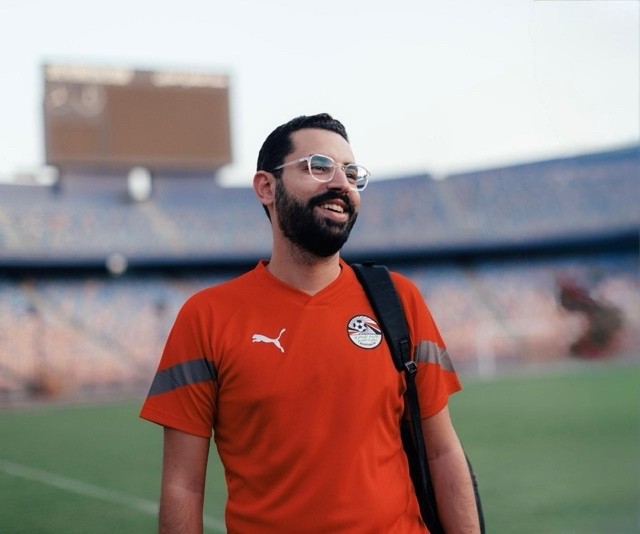
[ Background ]
During my studies, even from elementary school and high school, I had focused on French. When I graduated from college in 2013, I was searching for a job and started working as a French teacher. It was obvious to me that I didn’t really like it and had a bit of a hard time interacting with the kids but I kept going for a while.
Then, I started working in a call center for hospitality and air travel topics - still in French. This role helped me a lot with my accent while speaking in French. Here in Egypt, we always have the problem with pronunciation that you can tell when someone speaks French that they are not a native speaker. So, this was my challenge when I started working at the call center, to do the most I could do so the client wouldn’t ask me which country I was from!
So, I improved my French a lot but I felt that my ideal job is not just staying in the office sitting behind a desk, behind a laptop, that wasn’t how I wanted my career to go. I resigned and started searching for something a little more attractive.
Again, my French helped me, the most important TV channel for sports here - ONSport - they reached out to me to help them with translations for guests in French and English. I felt like this was a good career move because it wasn’t just behind the desk, you don’t stay in the same place or do the same thing every day. I started working with them as a freelancer for about two years.
It was through this job that the Federation (Egyptian Football Association) got to know me and one of my college colleagues actually recommended me when the Olympic football team of Senegal came to Egypt and wanted someone who spoke French to stay with them for two weeks. That was my first time interacting directly face-to-face with celebrities and people who work in football.
[ Had you played football in the past? Were you a football fan? ]
I think during my 33 years, I’ve only played football 5 times! You can see I’m wearing glasses - and playing football with glasses, it’s not that easy. Every time I played at school, I came back to my parents with broken glasses, they said maybe to try another sport!
I wasn’t a huge fan of football before working in this career. How was Mina 10 years ago? Probably, if I found a movie being broadcast on TV, I’d change the channel from the match to see the movie.
But once I started this career and I started working in football, my hobbies and interests have changed. I started learning more about football, doing some research, watching a lot of games, learning about tactics and so on. I think this has helped a lot, even if my job is administrative and not tactical - it’s not about something happening on the pitch, but I think it’s better to have some knowledge about tactics and what’s going on, this can help a lot in my job.
[ In this first role supporting the Senegalese team, what did you actually help them with? ]
I think that this experience helped me build my current career. When a foreign team comes to Egypt to play a match, they don’t know anything. They don’t know where the training pitch is, they don’t know the hotel, the people, if they need something during their stay - they don’t know the language either, so it can be difficult for them.
So, you became a part of their staff for their stay in Egypt and do everything with them. You start at the airport, greet them and help with everything from the visas and immigration. Once we leave the airport and go directly to the hotel, it’s you who is responsible for everything regarding their stay and all the interactions with the hotel staff. Most of the French-speaking countries in Africa don’t speak Arabic and often speak very little English and to find someone who speaks French in a hotel, it’s not easy.
The team gives you the program, the schedule for every day, and it’s you who’s coordinating with the drivers, with the stadium for the training sessions, with the other team and whatever else is needed.
After the Senegal Olympic team, I started helping more teams coming to Egypt. I started only with French-speaking and later it became French and English because it’s much better to have the same person, who knows the drivers and the places, it makes it much easier.
"When a foreign team comes to Egypt to play a match ... They don’t know where the training pitch is, they don’t know the hotel, the people, if they need something during their stay - they don’t know the language either, so it can be difficult for them"
[ Who, in the foreign team, are you coordinating with the most when they arrive? ]
This depends on the personalities of the staff at each federation. Usually, if we are talking about a professional level, it should be the team manager and I won’t have any interaction with the head coach - who’s only working on the tactics or the head of delegation - he’s an official representative for the federation, so it’s not my job to interact with him.
Each team is different though. Sometimes it’s only the head of the delegation, one of the board members, who I speak with or, some countries only delegate their head coach to interact with the interpreter. It’s a good experience to work with lots of different people. Sometimes, for example, Sébastien Desabre is a French coach of DR Congo, but he was a head coach here in the Egyptian leagues and when he comes back, he already knows a lot about Egyptians, he knows what to ask, when to ask, and so on, that really helps but usually it’s the team manager only.
[ Do all countries have someone in this role? Like, when Egypt plays abroad, does someone support them in the same way? ]
Usually, this is a regulation of FIFA, that during the competitions, it’s mandatory that the Federation provides someone who can help. This role is usually called Team Liaison Officer or TLO and it’s obligatory for the national federations to have someone who can speak the language of the visiting countries.
Now, as an admin of the A team, I think some countries don’t respect this very well but often it isn’t a major thing if they speak the same language as they can interact directly. But when a French-speaking country comes to Egypt, it’s hard to communicate, so we try to make them feel at ease as much as they can.
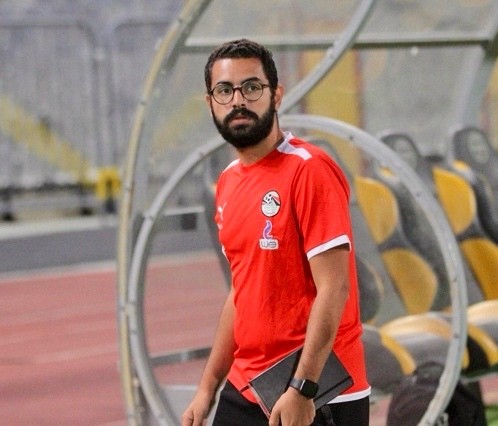
[ Eventually, you moved away from translation and interpreting into a more internal role at the Egyptian FA, how did you make this move? ]
Yes, so, the timeline was like this - I had been working as an interpreter for two years, moving around from TV channels, offices, school and so on before starting with the national teams in 2015. Then, I think in November 2016 or early 2017, one of the board members of the FA, saw that Mina can speak English and French, he’s a well-behaved person and well educated and thought we can benefit from his skills in a full-time job instead of waiting for national teams to come.
It was a surprise to me! One day, I went to the office and you can imagine, a young person, I was about 23 years old and at 8:30am, a board member of the Federation came to visit my desk. He told me they had made a decision that I should move to a national team and become the administrator of that team. I thought they might be talking to someone else!
So, I joined the Egyptian U20 national team who were qualifying for the U20 World Cup at the time. We traveled a lot and went to Jordan, Oman, the Emirates, Tunisia and Senegal. Most of these players are now working with us in the A-team. It’s very important that you deal with everybody in a good manner because you never know who these people will become! If you talk with them as kids or very young people and don’t think they are that important, tomorrow they might become captain of the team and have the authority to say that this person is not a professional person. Well, thank God I was good with them!
After this experience, more people at the Federation started to know my name as someone who can do a good job. Then, in 2018, we hosted the Beach Soccer Africa Cup of Nations for the first time in Egypt. We had one person in charge of the competition and I was helping him - as we say here in Egypt, I was his ‘right arm’. We went to Sharm El Sheikh, a very beautiful city by the Red Sea and I became responsible for all the teams, people from CAF, officials and so on. I gained a lot of experience in logistics, hotels, flights, everything.
Just after we finished this competition in January 2019, Egypt got the news they would host the Africa Cup of Nations. It was a surprise for everybody. Again, the Federation chose a manager for the competition, this time a very young person from outside the Federation, a famous player here in Egypt. He started to make a committee to manage the competition. He wanted to have 5 or 6 young people to deal with everything involved in organizing. And again, I was surprised to be chosen by my federation to be one member of this local committee.
—^interviewer’s note: The 2019 AFCON was expected to be hosted by Cameroon until its bid was sidelined by CAF for non-compliance, giving Egypt just ~6 months before the start of the tournament to prepare
For the competition, we worked directly with CAF and with the other national teams. This was from January until August 2019. And again, surprisingly, after this, they chose me to become the administrator of the A-team starting from September 2019! It’s been a bit of a roller coaster.
[ What does the administrator of a national team actually do? What are you responsible for? ]
Here at the national team, we say that the day is 24 hours, the head coach is responsible for 2 hours, and we are responsible for the other 22 hours.
FIFA announces the calendar early, I think almost 5 years in advance, containing the competitions and the international windows, for example. Once we receive this calendar, we start to prepare with the head coach and understand what he wants.
For example, does he want to play friendly matches? Who does he want to play against? In the case of friendly matches, it’s our responsibility to call and send emails or letters to the other federations that the head coach wants to play. Once they agree and we get a confirmation, you give the details to the Federation, who will finalize the financial details - who is going to bear which costs and so on.
When everything is confirmed, we start the preparation. If you have international players, like now in the A-team, we have Mo Salah, Marmoush, Mostafa Mohamed, Ahmed Hegazy, Mohamed Elneny. We have a lot of players who are playing abroad - you have to contact the players, see the schedule of their matches and try to book good and comfortable tickets for them on the best route possible.
Then, one new thing we are doing that I don’t think all countries are doing yet, we do an inspection visit. For example, next we are playing Djibouti in Morocco. We (the admins) go beforehand to visit everything. Starting from the airport - we check the process at the airport, the immigration, the time it takes from the airport to the city center. We visit all the hotels we’ve identified to see them in person and make sure we pick the most suitable one.
Choosing a hotel for a football team is very different from choosing a hotel when you go on vacation. We have a lot of criteria that need to match. For example, how many rooms are on one floor - usually we try to book all together in one or two floors - we need a private dining room and a private meeting room and things like this as well.
On the inspection visit, we also go to the stadium and take videos and pictures of the condition of the grass, of the rooms - whether they have AC or not. We got to the hospital and see how long it takes from the stadium to the hospital, what the hospital is equipped with - our team doctor always sends a checklist and we have a meeting with the head of the hospital to check everything.
When we get back to Egypt, we have a meeting with the head coach and share our findings and feedback and make a decision together on everything from the pitch we will train on to the hospital we prefer in case of emergency.
This is all before the camp, before any of the players arrive. Once we’ve agreed, we start to prepare everything for the visit. We book a hotel here in Egypt to gather the players when they arrive and book all the transport. It’s an official delegation, we can’t move with everyone in different outfits, so we have to start ordering and preparing the outfits - making sure we have the right sizes and printing the names and numbers for each of the players.
We’re not responsible for the match but we are responsible for the whole delegation. So, everybody’s passport, everybody’s money, every transportation, every request, everything that happens outside of the pitch is your responsibility. You can imagine dealing with 55 people and each of them has an issue in their room! If they don’t have Wi-Fi in the room, you have to check each and every room with a technician and make sure everybody is settled and everything is good.
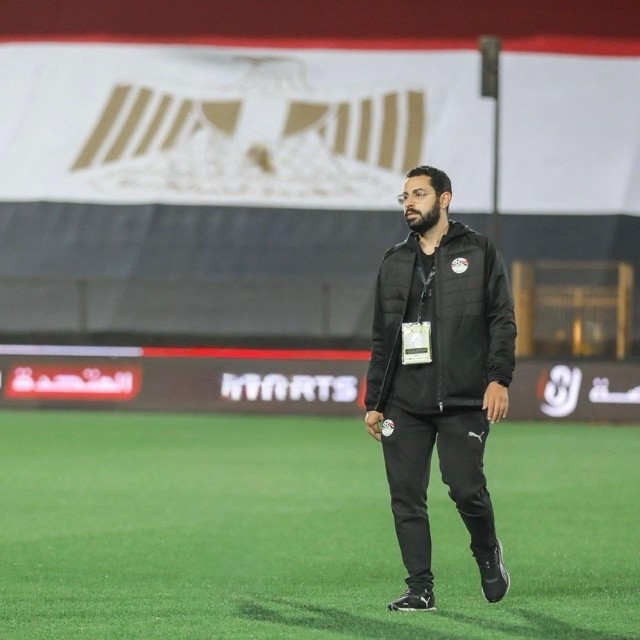
"Here at the national team, we say that the day is 24 hours, the head coach is responsible for 2 hours, and we are responsible for the other 22 hours"
[ After the camp, is there some kind of feedback or review of your ‘performance’ from the players or the coach? ]
We get feedback in two ways. The first is from people - I think you will be wise enough when you arrive at the hotel or the plane or the dining room, you can see on people’s faces and how they’re looking at you and what they think!
The second way is an internal way for myself and for my colleague Ali. I have a very important colleague with the A-Team, called Ali Mohamed Ali. We’ve been working together closely now for 6 or 7 years. What we like to do is go to each department of the team and speak with them, find out what was good and what we need to modify for the next trip. We do this with our medical department under the supervision of Doctor Mohamed AboElelea, the technical staff and with the captains of the team.
This has been really helpful for us to improve, especially at the beginning. It’s been 6 years since our first camp but you can imagine the first camp - we didn’t know the players, we didn’t know the staff, we knew nothing about the company for the transportation, the hotels - there are a lot of things you are trying to do in a professional way.
[ What about if you are going to a city you’ve already been to - or maybe the U20s have been there recently, do you try to keep things the same? ]
Yes, we’re going to Morocco next - to Casablanca, and we were just playing in Casablanca in March 2025 - so it’s only been 6 months. In this case, you skip the inspection visit and just start calling the people there to make sure everything is settled as it was last time.
We also give feedback sometimes to other clubs here in Egypt that are traveling abroad, they might ask which hotel we stayed at or which drivers we used in different cities. This is usually good feedback, in an indirect way, because it’s often players at the club who’ve been with the national team to that place and suggest to their club that they speak with us so they can do the same.
[ Are you friendly enough with other FAs to ask for or share recommendations or is this too risky among rivals? ]
I think you wouldn’t ask for this information from other national teams on a professional or official level but this is why relationships and friendships in football are very important. If you try to work alone and do everything by yourself, at a certain point you will lose your way.
It’s very important to have very good relationships with other people, especially people who maybe aren’t that ‘important’ but are very valuable and very important in our industry. You don’t have to be FA president or a head coach to have the right information and be important. Sometimes the smallest person at a federation or organization is the one who can guide you to the right place - that’s what’s really interesting and important to understand in our industry.
In some industries, you always have to talk with the ‘big guy’ to get information, but for us, sometimes you have to talk to the bellhop at the hotel and he guides you - because if you ask the FA president where you can buy some ice, he can’t help you!
Just a few days ago, an Egyptian friend sent me a message about a friend request on Facebook where I was the only mutual friend and asked me, ‘who is this person?’ I knew him from 8 or 9 years ago, he was our driver in Gabon! He was very helpful and even though he was ‘just’ the driver, he knew everything - what to buy, what to do, how to get around and so on.
So, talking with people from other FAs, it’s very important on a friendly level because it’s a win-win situation. When someone from Morocco is coming to Egypt and asks which hotel is better - it’s about trust. When you gain someone’s trust, you’ll never lose it - but if they ask your opinion, you have to say it honestly 100%. If you say the hotel is too far away and he comes to Egypt and finds that the hotel is really far from the stadium, you can build trust from there.
"You don’t have to be FA president or a head coach to have the right information and be important. Sometimes the smallest person at a federation or organization is the one who can guide you to the right place"
[ Is there a budget for these trips? Do you ever decide one option is perhaps the ‘best’, but you end up with another because it’s cheaper? ]
I think it's not about being cheaper, we usually have an open budget. It’s always different with the A-team versus the youth team. Working with the youth team, we are always talking about the budget.
For the A-team, you might have 55 people staying somewhere for 5 nights, plus transportation, visas and so on. We are talking about a huge number in US dollars. The challenge with the A-team is not about the budget but about the options. In some countries, there aren’t many hotels. If you search on Google or Booking.com for hotels in Ouagadougou, the capital of Burkina Faso, you’ll only find two hotels - there are lots of motels and lots of good places, but only two hotels.
Sometimes you have to compromise. We went to Malawi once for a match and the dining room, we had two options - either eat at the public restaurant or take it to a room that I think was only 4 meters by 3 meters - for 55 people! It’s a tough decision but we took the small room as it was the only private place.
We’ve had places without private rooms to have team meetings. The meetings are confidential because the coaches are talking about tactics and once we had a room that was covered on all sides by glass - so everybody on the street can see what you are doing inside! So we had to cover the walls with banners, pop-ups and things like this that we brought from Egypt.
I think the important things are to fulfill what the coaches need and for the players to feel safe and positive.
[ How is the preparation different for actual tournaments (e.g. AFCON/World Cup) compared to these short trips for qualifiers or friendlies? ]
My first time with the team as part of the staff at an official competition was the AFCON in the Ivory Coast in January 2024. Before that, I’d only been part of the organizing committee for the hosts, but as a guest, it differs a lot.
You have to prepare everything 2-3 months beforehand. Traveling for a qualifier, it’s usually just 48 or 72 hours, so you don’t have to take a lot of things, only food, medication, medical equipment, clothes, etc, for only about 3 days. Moving for a whole camp for one month or one month and a half was very interesting.
3 months before the start of the competition, they (the organizing country) sent us a huge document asking for all the things they needed to know - from how many people are going and the weight of our luggage to what time we will arrive, they want to know every single detail. For them, it’s very important because in a final tournament, you are working with 24 or 32 teams - a lot of people, a lot of hotels, a lot of training sites and a lot of events. When you want to change one thing, you have to coordinate with all the other people. If you’re not well prepared before you go, I think you will get lost in a tournament.
For example, they ask what time you want to do your training and if you choose, say, 7pm to 9pm, and once you get there, you find out the weather is not that good at that time and you want to move it to 9 to 11. It’s not easy to make this change because you have to talk with the organizing committee, they have to talk with the other teams that are training on that pitch, just to reschedule your training time for one hour. If you haven’t done your work earlier and know the weather at this time…
That’s why the inspection visit is important. When we went to the Ivory Coast for our inspection visit, the training pitch didn’t have fog lights - so unless they installed lights at the site, we made sure we didn’t get stuck with training sessions at night. Other national teams got this wrong because they didn’t do an inspection visit and they went into the final tournament blindly - and they had issues regarding the hotel, the training site, the stadium and so on.
[ How are you thinking about your future? What could the next step look like? ]
I think this is a very tricky question! For the short term, I think it's very important for myself, for my career, and for my experience to go to a World Cup, because in 2018, I wasn't with the team and in 2022, we didn’t reach the World Cup. So, for the short term, what’s important to me is attending the AFCON in Morocco and attending the World Cup in the USA, Canada and Mexico.
In the long term, I’m considering how I will grow in my job. When you are in the same role for 5 or 6 years, at a certain time, you can feel that you are standing where you started and have to move on.
I think that a good option is to wait and see what's going to happen after the World Cup. You have two options, either you can move on at the same place, but in a new level of hierarchy - to be on a managerial level - or you can move to another country in Europe or the Gulf area, for example. I think if you put on your CV that you organized two AFCONs - one for beach soccer and one for the A-teams, you attended a World Cup and two AFCONs as staff, you will have valuable experience for other people.
I think the key to winning and the key to having a good career and a good personality is that your legacy is not only about your name but also about the people you’ve taught and helped. In this career, it’s important to understand that there is a very, very low amount of jobs, and a lot of people who want to work in these places. So when you see someone starting their career, taking their first steps, my colleagues and I try to help them and share what we know.
